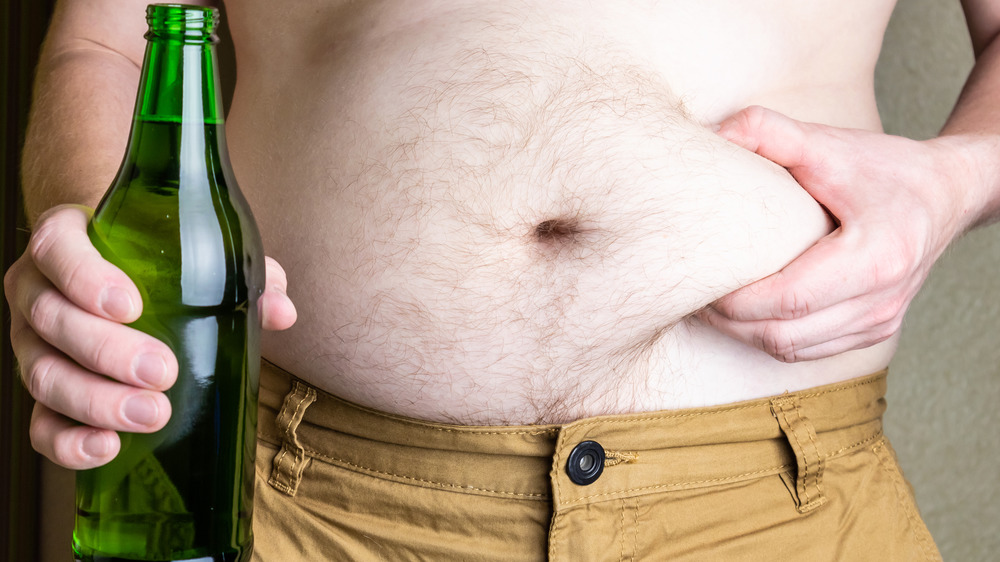When You Drink Alcohol Every Day, This Happens
To drink, or not to drink? When it comes to food science, few subjects are as controversial. There are a number of studies that seem to show health benefits from daily consumption of wine, and even studies showing that beer can be beneficial. Every once in a while, someone even comes up with a study that seems to show a link between daily doses of the hard stuff and living a longer life, although some of these results may be more correlative than causative. Betty White, for example, claims to thrive off a diet of vodka and hot dogs, but this one-of-a-kind actress is definitely the exception to the rule here (as in so many other things).
When in doubt, it's always a good idea to seek out expert advice, so Mashed consulted with Dr. Nicole Avena, a research neuroscientist whose areas of expertise include the fields of nutrition, diet, and addiction. Her take on the subject of alcohol consumption may disappoint anyone looking for an excuse to remain sober-incurious: she really doesn't see any upside whatsoever to drinking alcohol on a daily basis, and in fact, feels that you can lead a perfectly healthy life without touching a drop.
The health benefits of alcohol are overrated
The one type of alcohol that has practically been elevated to the level of a superfood is red wine, all on account of the resveratrol it contains. This miracle antioxidant has been credited with curing or preventing everything from high cholesterol to Alzheimer's to sunburn, but Avena's still not sold on the wonders of wine. "Contrary to popular belief," she explains, "there is not compelling evidence to suggest that drinking a glass of red wine every night can have any discernible health benefits, such as reducing risk of heart disease." While she acknowledges that resveratrol can be beneficial, she says that red wine only contains small amounts of this substance and warns "it would take several glasses of wine to actually see any benefit from this compound, and drinking that much wine would ultimately have more negative consequences than benefits."
LiveScience notes that red grapes also contain resveratrol since fermentation isn't necessary to produce it and that other good food sources of the compound include blueberries, peanuts, and dark chocolate. There's no need to overload on any of these items, however, since they also point out that excess amounts of resveratrol can counteract some of the health benefits from exercising, while the Harvard Health blog reports on a 2014 study of 800 people showing no correlation whatsoever between high resveratrol levels and good health.
How daily drinking can be harmful
From a nutritional perspective, daily drinking can do more harm than good. Avena cautions that "alcohol can impair how well the body digests and absorbs nutrients that are crucial for the proper function of the body," saying that it does this by damaging some of the cells found in the stomach and intestines that are necessary for absorbing vitamins, minerals, and macronutrients such as fat. Alcohol also contains both calories and carbs but provides little nutritional value in return.
While these calories can contribute to weight gain, Avena warns that sometimes they can have a different but also detrimental effect. "Calories from alcohol," she says, "are sometimes not stored by the body the same way as calories from food." What this means is that sometimes drinkers, particularly ones who imbibe every day, may be replacing some of their food calories with booze calories. Avena does say that "this can potentially lead to weight loss," but she adds, "though not in any positive way" and warns that this calorie replacement can also lead to nutritional deficiencies.
Your body can become dependent on alcohol
While you may not consider yourself to be mentally dependent on alcohol even if you're in the habit of drinking every day, Avena says your body may feel otherwise. And once your body gets used to that daily dose of booze, this physical dependency may lead to a whole range of conditions, including high blood pressure, heart disease, seizures, and depression, What's more, if you stop drinking, you may also develop withdrawal symptoms including shakiness, insomnia, and anxiety.
There's also a very real risk of developing alcoholism even if you don't have a genetic predisposition to this condition. Avena describes it as "a complex disease that involves genetic and environmental factors," and drinking on a daily basis most definitely counts as an environmental factor. While Avena allows that it may be possible for someone with no family history of alcohol addiction may be able to drink every day without developing a problem as long as they only do so in very limited amounts, she states that, as a general rule, "excessive drinking in anyone can lead to negative effects on health and can lead to some type of alcohol use disorder." In short, no bombshell revelations here. If you're going to drink, use some common sense, do so in moderation, and don't fool yourself that you're doing so "strictly for medicinal purposes." That old line was always meant as a joke since drinking is a choice that you make on your own and you can't shift the blame to your doctor.



